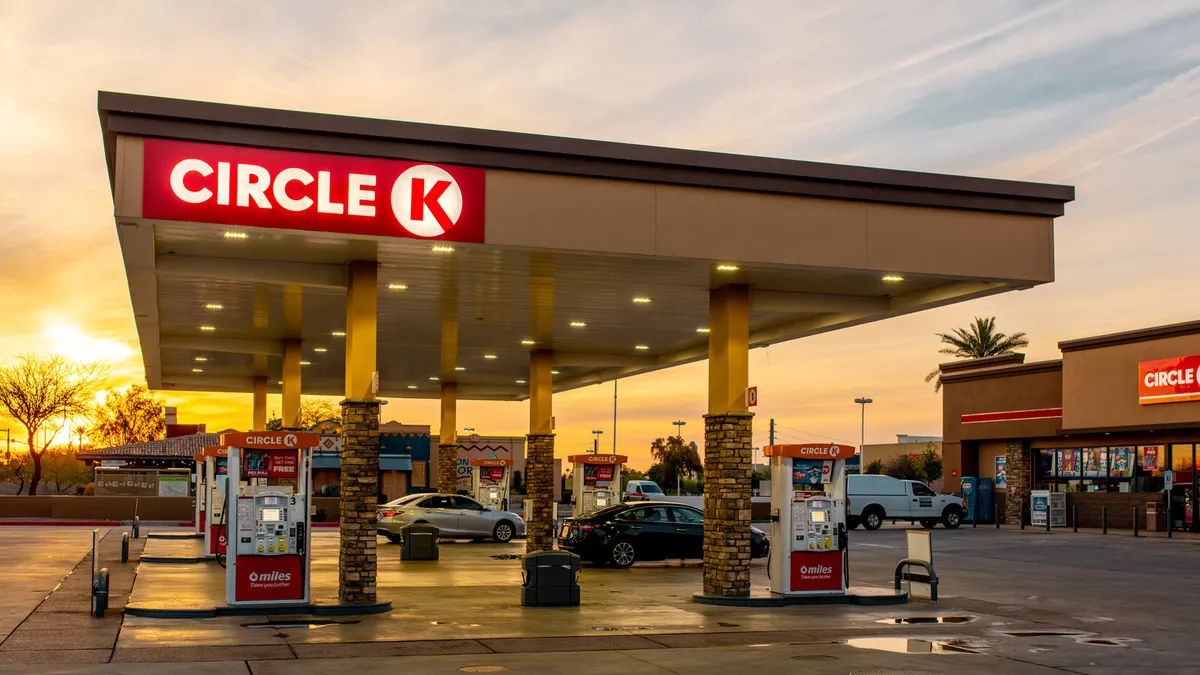Dive Brief:
- Alimentation Couche-Tard of Canada, the operator of the Circle K convenience store chain, will be piloting autonomous checkout technology from artificial intelligence startup Standard Cognition, according to a press release. The test will begin with a single store in the Phoenix area and later expand to an unspecified number of additional Circle K locations.
- Standard Cognition's technology will enable customers to purchase items without needing to scan them or interact with a payment terminal. Instead, cameras installed on the ceiling will work hand-in-hand with artificial intelligence and machine vision software to track what people intend to buy and charge them via a smartphone app.
- The frictionless shopping technology will operate as an add-on to the processes and hardware already in place at the store where Circle K will be launching the pilot. Customers will also have the option of paying with cash or using credit or debit card at a kiosk or traditional checkout counter.
Dive Insight:
Standard Cognition’s approach to eliminating cashiers and payment terminals from the retail experience resembles the Amazon Go concept, but there is a key difference. While Amazon is developing stores that allow customers to simply walk out with purchases from the ground up, Standard is focused on allowing retailers to tack frictionless capabilities onto existing stores without having to make major changes to their facilities or systems.
Alimentation Couche-Tard plans to hold onto the fixtures and lighting already installed in the Circle K location where it will be running the test. The layout will not change, either, and the store will continue to use the inventory management and replenishment processes it has been using to run the store.
The technology supplied by Standard does not need biometric information from shoppers to operate. The system also does not use shelf sensors, which sets it apart from the way Amazon Go stores run.
The ability to retrofit a store instead of making significant modifications was a key reason Alimentation Couche-Tard decided to partner with Standard, the c-store operator’s head of global digital innovation, Magnus Tägtström, said in a statement.
Other technology firms, including Trigo Vision and Grabango, have been developing checkout-free systems that can be retrofitted onto existing stores. Grabango began testing its system inside a Giant Eagle c-store last year, while Trigo installed its technology inside a 3,000-square-foot Tesco store last fall. Tesco also made an undisclosed investment in the Israeli company.
With their small size and focus on quick trips, convenience stores for now appear to be the best fit for checkout-free technology. According to experts, the AI and sensor-based systems struggle to process information in stores larger than 10,000 square feet. Amazon Go Grocery's Seattle store, the largest location so far to incorporate just-walk-out technology, has a retail floor that's 7,700 square feet.
Earlier this year, 7-Eleven opened a cashierless store at its headquarters in Irving, Texas — the latest development in the chain's efforts to speed up checkout.
The rollout of contactless payment options has accelerated during the COVID-19 pandemic, with retailers announcing new mobile payment integrations, smart carts and the expansion of scan-and-go programs.
Standard has also been working on strategies to help retailers that add its technology guard against the possible loss of the impulse purchases that often take place at traditional checkout counters. In November, the company formed a partnership with confectioner Mars Wrigley to examine ways to encourage impulse purchases even as they embrace autonomous payments.
Standard has raised $86 million from a variety of investors to support its efforts to shake up the retail landscape. The company’s backers include Initialized Capital Management and Y Combinator, both of which helped fund grocery e-commerce giant Instacart.
Like Alimentation Couche-Tard, German grocer Aldi has also been paying attention to the technology that can automatically identify products selected by shoppers, according to a report in Charged. The company’s unit that operates in the United Kingdom has reached out to tech companies with a call for ways to sense items using cameras or smartphones, according to the publication.













